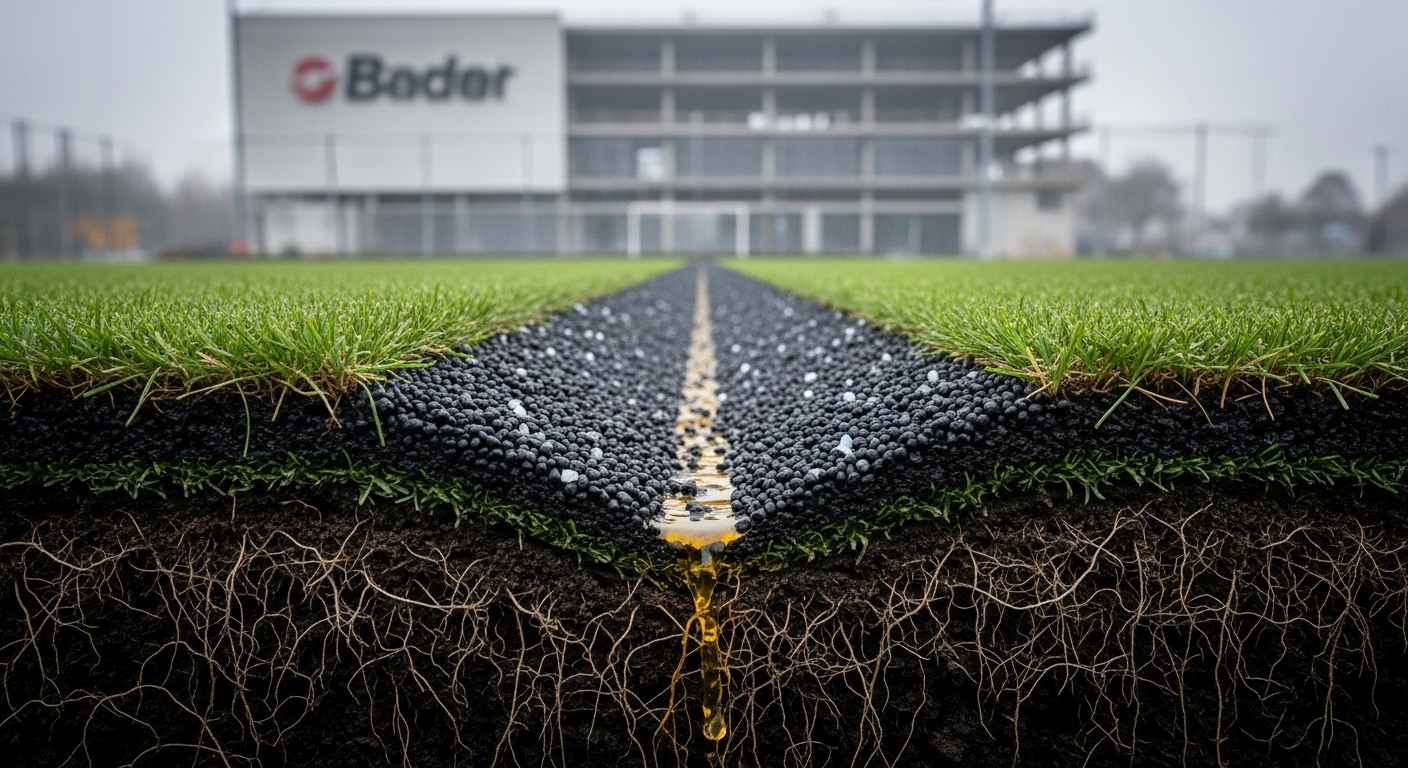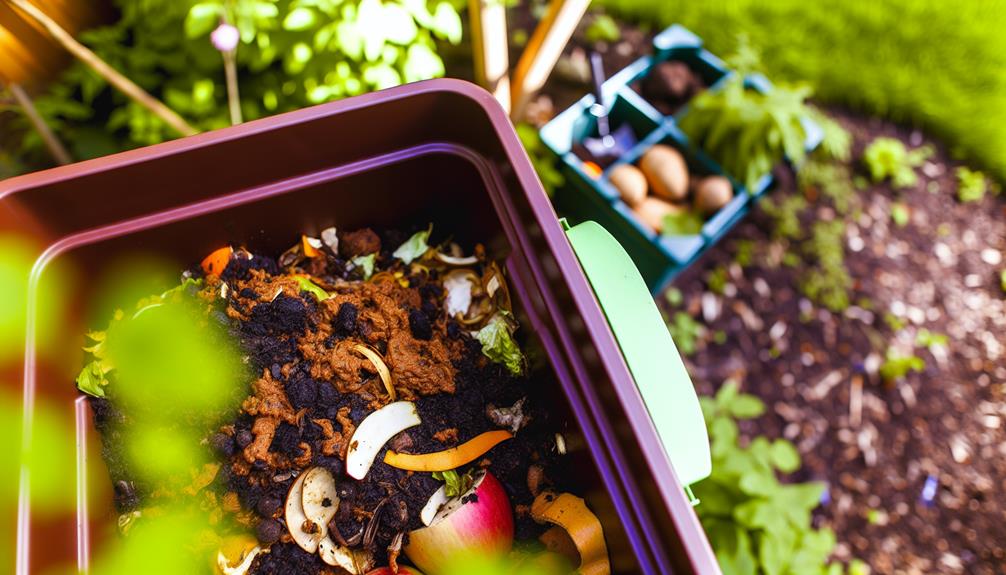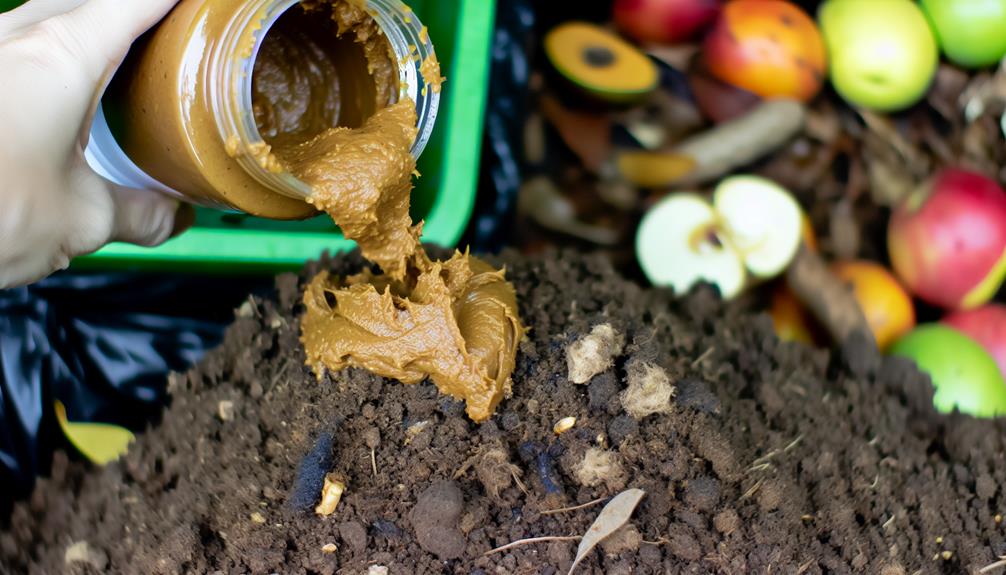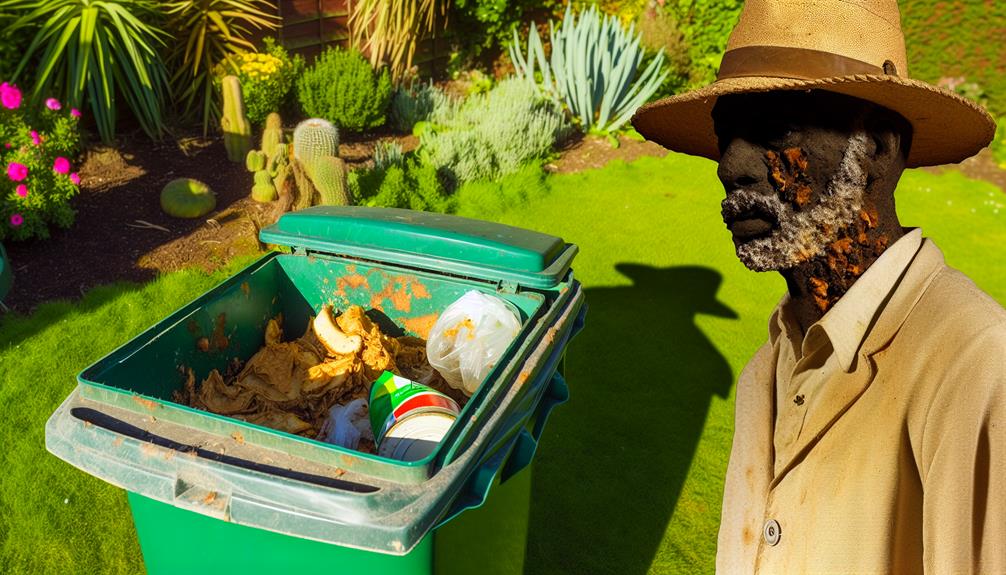

You can compost peanut butter, but it’s tricky. The oil-based nature of peanut butter slows decomposition and can attract pests like rodents and insects. To compost peanut butter safely, use very small amounts and mix it thoroughly with other compost materials. Guarantee a good balance of green (nitrogen-rich) and brown (carbon-rich) ingredients to support efficient breakdown.
Regularly turn and aerate your compost to manage any issues. Alternatively, consider repurposing peanut butter in homemade pet treats or DIY bird feeders. For more tips and methods to handle peanut butter in compost, there’s more to explore on this topic.
Peanut butter, a common pantry staple, is made by grinding roasted peanuts into a smooth or chunky spread. If you’ve ever wondered about its nutritional benefits, here’s what you need to know.
Peanut butter is rich in protein, healthy fats, and essential vitamins and minerals like Vitamin E, magnesium, and potassium. These nutrients make it a great choice for a balanced diet, providing energy and supporting overall health.
When it comes to ingredient composition, peanut butter is quite simple. Most varieties contain just peanuts and a pinch of salt. However, some brands add sugar, oils, or other additives to improve taste and texture. It’s always a good idea to check the label to make sure you’re getting the most natural product possible.
Understanding what’s in your peanut butter can help you make better choices for your health and well-being. By opting for natural, minimally processed varieties, you can enjoy all the nutritional benefits without unnecessary additives. Whether you’re spreading it on toast, adding it to smoothies, or using it in recipes, knowing the basics of peanut butter can help you incorporate it wisely into your diet.
Composting is an excellent way to recycle organic waste and enrich your garden soil. By turning kitchen scraps and yard waste into nutrient-rich compost, you’re creating a sustainable cycle that benefits both your garden and the environment.
You’ll find composting not only reduces the amount of waste you send to the landfill but also provides a natural fertilizer for your plants.
To start composting, collect organic waste such as fruit and vegetable scraps, coffee grounds, and eggshells. Avoid adding meat, dairy, or oily foods at this stage. Your compost pile needs a balance of green materials (nitrogen-rich) and brown materials (carbon-rich).
Greens include items like grass clippings and vegetable peels, while browns are things like leaves and cardboard. Properly balancing these materials helps your compost break down efficiently.
Turn your compost pile regularly to aerate it and speed up the decomposition process. Keep the pile moist, but not too wet, to maintain the ideal conditions for microorganisms to thrive.
Over time, you’ll notice the organic waste transforming into dark, crumbly compost. This finished product can be mixed into your garden soil, providing numerous composting benefits like improved soil structure and fertility.
Also Read: Can You Compost Cantaloupe?
Including fats and oils in your compost pile can complicate the decomposition process and attract unwanted pests. While you might want to increase the nutrient content of your compost, introducing fats and oils—such as those found in peanut butter—can lead to more problems than benefits. These ingredients break down slowly and can create an imbalance in the compost, making it less effective.

When thinking about ingredient variations, it’s important to remember that not all compostable items are created equal. Fats and oils can take a long time to decompose, often leading to a rancid smell that can attract rodents and insects. This not only affects the efficiency of your compost but also can make your garden less pleasant.
To maintain a healthy compost pile, focus on adding materials that decompose at similar rates. Stick to fruit and vegetable scraps, coffee grounds, eggshells, and yard waste.
If you do choose to add small amounts of fats and oils, make sure they’re well-mixed and in minimal quantities to avoid any negative impact. By carefully selecting what you compost, you can create a nutrient-rich soil without dealing with unwanted pests and odors.
When composting peanut butter, you’ll encounter several decomposition challenges. The oil-based residue can impede the composting process, attracting pests and causing a slower breakdown.
To manage these issues, balance your compost with high-carbon materials and regularly turn the pile for better aeration.
Oil-based residues in peanut butter can greatly impede the decomposition process in your compost pile. Peanut butter’s high oil content stems from its production process, where peanuts are ground and their natural oils are released and often augmented with additional oils.
While peanut butter offers nutritional benefits when consumed, its oily nature poses a challenge for composting. When you add peanut butter to your compost, the oils can create a barrier that slows down the microbial activity essential for breaking down organic matter. This results in a longer decomposition time, which can disrupt the balance of your compost pile.
To mitigate this, you can take a few steps to minimize the impact of oil-based residues. First, make sure you’re adding peanut butter in very small amounts. Mixing it with other high-carbon materials like leaves or straw can help absorb some of the oil.
Next, consider chopping or spreading the peanut butter thinly over larger compostable items to increase surface area and promote faster decomposition. Lastly, turning your compost pile more frequently will help distribute the oils and improve aeration, aiding the microbial process.
These steps will help you manage oil-based residues effectively in your compost pile.
Despite its benefits, adding peanut butter to your compost pile can attract pests, complicating the decomposition process. The high-fat content and lingering scent of peanut butter are especially appealing to rodents, insects, and other unwelcome visitors. This can disrupt the balance of your compost, making it less effective and more challenging to manage.
To mitigate these issues, consider a few strategies. First, always mix peanut butter thoroughly with other compost materials, such as leaves and grass clippings. This can help to mask its scent and reduce its allure to pests. Additionally, avoid adding large quantities at once. Smaller amounts are less likely to attract animals and can decompose more evenly.
Be mindful of nut allergies when sourcing ingredients for your compost. If you or someone in your household is allergic, it may be best to avoid composting peanut butter altogether. Instead, opt for safer alternatives like fruit and vegetable scraps.
Lastly, maintain a well-aerated compost pile. Turning it regularly will help to speed up decomposition and minimize odors. By taking these precautions, you can enjoy the benefits of composting while minimizing the risk of attracting pests.
Addressing the issue of pests is just one part of the challenge, as peanut butter also tends to break down slowly in compost piles. This slow decomposition is due to its dense, oily texture and high-fat content. The production process of peanut butter involves roasting peanuts and grinding them into a paste, which makes it much more resistant to microbial activity compared to other organic materials.
The nutritional value of peanut butter, specifically its proteins and fats, further complicates the composting process. These elements don’t break down as easily as carbohydrates or plant matter.
To help you understand, here’s a breakdown:
| Factor | Impact on Decomposition |
|---|---|
| Oil Content | Slows microbial activity |
| Protein Levels | Requires specific microbes |
| Density | Limits oxygen penetration |
| Production Process | Increases resistance |
To speed up the composting process, you can mix peanut butter with other high-carbon materials like leaves or straw. This increases aeration and balances the carbon-to-nitrogen ratio. Also, chopping or spreading the peanut butter thinly helps microbes access it more easily. Remember, patience and proper management are key to successfully composting peanut butter.
Also Read: Can You Compost Cat Food?
Encountering issues with composting peanut butter often stems from its high fat content and slow decomposition rate. This can lead to several potential problems in your composting efforts.

Here are three key issues to keep in mind:
To avoid these problems, you’ll need to be cautious and well-informed about the materials you add to your compost pile. By understanding the origins and potential risks associated with peanut butter, you contribute to a healthier, more effective composting process that benefits everyone in your community.
To safely dispose of peanut butter, consider incorporating it into a hot composting system or using it as a feed for vermicomposting. Hot composting effectively breaks down peanut butter, turning it into nutrient-rich compost. The heat generated helps to accelerate decomposition and minimize issues like attracting pests. Be sure to mix it well with other compost materials to guarantee even breakdown.
If you prefer vermicomposting, peanut butter can be a valuable addition. Worms thrive on the fats and proteins found in peanut butter, converting it into rich worm castings. However, avoid adding too much at once as it can create an imbalance. A small, well-mixed amount will do the trick.
For those concerned about nut allergies, it’s important to handle peanut butter disposal with care. Always use gloves and thoroughly clean any tools or containers used to avoid cross-contamination. Additionally, proper storage tips can help extend the shelf life of peanut butter, reducing the need for disposal. Keep it in a cool, dry place and make sure the lid is tightly sealed.
Beyond safe disposal, you can repurpose peanut butter in creative ways that benefit both your household and the environment. By thinking outside the jar, you’ll find that peanut butter has numerous nutritional benefits and versatile culinary uses.
Here are a few ideas to get you started:
Embracing these creative repurposing ideas can help you make the most of peanut butter’s nutritional benefits while contributing to a more sustainable household.
Also Read: Can You Compost Yogurt?
Many eco-friendly alternatives to peanut butter can reduce your environmental impact while still providing delicious and nutritious options. One such alternative is almond butter, which often comes from sustainable sourcing practices. When choosing almond butter, look for brands that prioritize eco-friendly farming and minimal plastic packaging.
Another great option is sunflower seed butter, known for its rich nutrient profile and lower environmental footprint.
Cashew butter is another tasty and sustainable alternative. Cashews are often sourced from regions that practice sustainable agriculture. By opting for cashew butter, you contribute to supporting these eco-friendly farming practices. Always check the packaging to make sure it’s recyclable or compostable.
Hazelnut butter, often overshadowed by its chocolatey counterpart, can also serve as a delightful and eco-friendly option. Look for brands that emphasize sustainable sourcing and use minimal plastic packaging.
Lastly, consider making your own nut or seed butter at home. This not only reduces plastic waste but also allows you to control the ingredients, guaranteeing a healthier, eco-friendly product.
You’re wondering about decomposition rates for peanut butter. It’s tricky since it’s dense and oily. Generally, it takes months to break down, as organic matter like this doesn’t decompose quickly. Stay patient; your compost thrives eventually!
Yes, animals can be attracted to compost with peanut butter. Understanding animal behavior and implementing pest control measures can help you manage your compost effectively, ensuring a harmonious and eco-friendly community.
When composting peanut butter, you’ll want to explore alternative methods to balance its high nitrogen content. Adding plenty of carbon-rich materials like leaves and straw can help. Join a community garden group to share tips and experiences.
Yes, peanut butter can affect your compost’s pH level. It might disrupt nutrient balance and microbial activity. To keep your compost community thriving, monitor the pH levels and adjust with other compost materials as needed.
Homemade peanut butter is better for composting because you control the ingredient content, ensuring fewer preservatives and additives. This enhances nutrient content, making your compost healthier and helping you feel more connected to sustainable practices.
To sum up, it’s best not to compost peanut butter due to its high fat and oil content, which can disrupt the composting process and attract pests. Instead, consider safe disposal methods like sealed trash disposal or creative repurposing, such as using it in bird feeders.
Opt for eco-friendly alternatives when possible to minimize waste. By understanding composting basics and potential issues, you can make informed decisions that benefit your compost and the environment.
